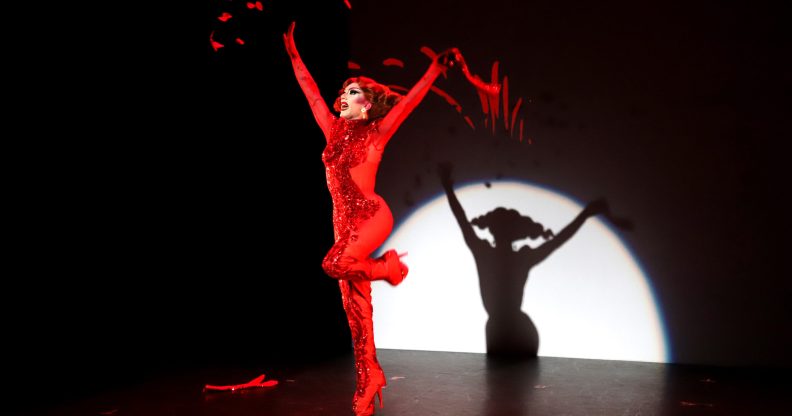Sasha Velour’s Smoke & Mirrors is her own important piece of queer history

Sasha Velour performing ‘So Emotional’ during Smoke & Mirrors. (Jeff Eason)
Exactly three weeks after Madonna stopped by with her Madame X show, Sasha Velour stormed the London Palladium armed with magic tricks, dazzling costumes and bundles of heart.
Going into to Smoke & Mirrors – Sasha Velour’s first-ever one-woman tour – it’s safe to say that many aren’t sure just what they’re getting themselves in for.
The Brooklyn-based queen is one of Drag Race’s most unusual and enigmatic products: a queer history buff with a penchant for philosophy and literature, who managed to turn a Whitney Houston lip-sync into pure performance art armed with little more than a few rose petals.
Taking to the historic Palladium stage Sasha sets out her intention for the night, stunning the audience into silence with a dramatic rendition of Sia’s “Cellophane” that’s heavy on heart, and even heavier on visual impact.
As she introduces the show, perhaps realising that some of us aren’t up to speed with the agenda for the night, she explains that Smoke & Mirrors will be “part bootleg magic show, party sexy TED Talk, part melodramatic performance art”.
“This is drag,” she says. “All you need is drama.”

Sasha Velour performing Nina Simone’s ‘Wild Is The Wind’. (Jeff Eason)
Indeed, over the next 90 minutes (plus intermission) we veer from campy magician’s routine (Sasha plays both conjurer and sawn-in-half assistant while lip-syncing Lana De Rey’s “High By The Beach”) to haunting stagecraft (Nina Simone’s “Wild Is The Wind” with Sasha transformed into a tree moving through the seasons), to – as she explained so succinctly – the world’s sexiest TED Talk (the phrase structuralist critique is thrown around with abandon).
Just like Madonna before her, she is a performer who uses the stage to recount her own legend through multiple lenses.
During the first of her two extended monologues, we’re told how her first professional drag production was a two-and-a-half hour scripted murder mystery, inspired by All About Eve and held in a taxidermy museum with a stuffed deer named Elizabeth Taylor, on account of the way her glass eyes sparkled (because, of course it was).
Immediately after this she performs “Fame” with doubles, triples and quadruples of herself twirling ribbons on a giant video screen, which glitches and trips to reveal how the routine is an evolution of her early performances at Nightgowns, the monthly Brooklyn drag show where she made her name.
Interacting with multiples of herself is a constant theme of the night, allowing Sasha to explore the concepts of the duality and the binary while recreating moments from her own mythology (including, of course, that winning Drag Race performance).

Sasha created all of the visuals for the show herself. (Jeff Eason)
Throughout it all, we’re reminded that this is her “love letter to the queer and trans community”, to the generations that paved the way for not only Sasha, but for every LGBT+ person sat in the room.
We’re asked to applaud ourselves, to take a moment to appreciate the power our queerness deserves and demands. At one point we’re reminded that the theatre we’re in, once host to Judy Garland and Shirley Bassey, is now commanded by a “bald Nosferatu queen” whose presence has attracted people of all genders, sexualities, shapes, sizes and colours.
It’s while on the topic of her bald vampiric aesthetic that the night’s most poignant moment comes about, as Sasha explains how her signature look is a tribute to her late mother, who died after battling cancer.
Mama Velour, by Sasha’s account, was a formidable woman. One who challenged Sasha on her drag, her performance and her feminism, but also taught her a powerful lesson about her own gender identity.
“She was the first person to teach me life is better when you express your gender with a little fluidity,” she recalls.
There isn’t a dry eye in the house. And as we leave the theatre we’re all little bit more powerful in our own expression, having experienced what genuinely feels like a small piece of queer history all its own.

